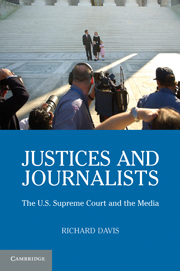4 - The Nineteenth Century
Published online by Cambridge University Press: 05 June 2012
Summary
On July 6, 1835, John Marshall died in his bed, surrounded by his family. The passing of the third chief justice in the Court's history signaled the end of an era. In the nearly half century the Court had been in existence, no justice had served as long as Marshall. Even today, his thirty-four-year tenure as chief justice has yet to be surpassed by any of his successors. More importantly, Marshall had permanently shaped the institution over which he had presided for so long.
The press of the day recognized the significance of Marshall's passing. The Richmond Enquirer, which had been no fan of Marshall, noted that “the city bells tolled yesterday nearly the whole day – guns were fired – and, perhaps no funeral procession, in this city, has ever been more extensive and solemn than the one which yesterday attended him to the grave.” The Richmond Whig and Public Advertiser opined that “no man has lived or died in this country, save its father George Washington alone, who united such a warmth of affection for his person, with so deep and unaffected a respect for his character, and admiration for his great abilities.” The Niles Register noted that “a great man has fallen in Israel.”
- Type
- Chapter
- Information
- Justices and JournalistsThe U.S. Supreme Court and the Media, pp. 54 - 81Publisher: Cambridge University PressPrint publication year: 2011



